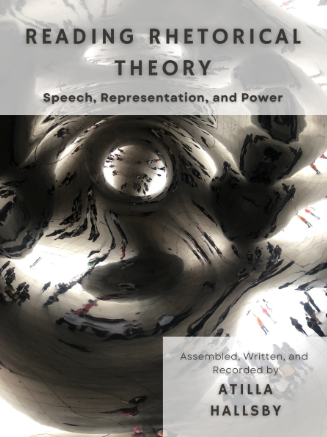Reading Rhetorical Theory
Editorial: University of Minnesota Libraries Publishing
Licencia: Creative Commons (by-nc)
Autor(es): Atilla Hallsby, Minneapolis
With the onset of the COVID-19 global pandemic in Spring 2020, I began the process of transitioning course
content from the in-person version of my large lecture, “Introduction to Rhetorical Theory,” to this platform.
My intention was to create an accessible repository for teaching materials that would enable students to access
the course remotely while minimizing the stress associated with this transition. After several semesters, I added
recorded lectures, supplementary embedded videos, and guidance for written assignments. In its present form,
the book now functions well for “flipped” modalities of teaching, both in-person and online. Given the
significant labor cost associated with transitioning courses online, my hope was to (1) offload some of the
effort of moving classes online by creating an open resource for other instructors to draw upon, (2) to provide
a basis for instructors to justify the appropriateness of a rhetorical theory course for an online modality of
teaching, and (3) to lighten the burden upon instructors and students at a time when online/in-person pivots
are increasingly likely and unpredictable.
Reading Rhetorical Theory also provides a number of additional advantages over a conventional textbook.
• There is no cost to either the instructor or the student.
• It enables instructors to teach in a range of modalities, or to move between online and in-person
administration as needed.
• It is formatted for reading/watching/listening on mobile devices and computers.
• The online format allows course content can be updated on the go, rather than releasing successive
editions over time.
• Chapters/entries offer multiple ways for students to receive the materials. The written chapters contain
the same content as the posted recorded lectures (although occasionally, the material posted in the
textbook will be more detailed to avoid excessively long recorded lectures).
• This resource is intended to provide a course shell that harmonizes with instructors’ and students’ needs
for online teaching while minimizing the amount of preparation required to teach.
Exam and quiz questions are currently available to confirmed course instructors on an individual basis. If you
wish to access assessment questions, contribute to this resource, supply correction notices for content and/or
broken links, or otherwise have feedback or requests regarding Reading Rhetorical Theory, please feel free to
send a message to me using the email address listed at the bottom of this page. To avoid confusion while
reading, please note! There is no chapter 13 in this book. Instead, Reading Rhetorical Theory skips
from chapter 12 to chapter 14.
Compartir:
Una vez que el usuario haya visto al menos un documento, este fragmento será visible.


